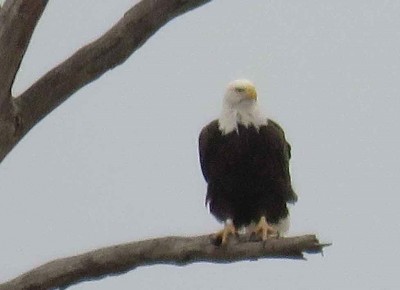Did you know that Augusta County has a pair of bald eagles nesting in Swoope? Last Sunday Michael Godfrey invited me out to Swoope to see them for myself. I have always had an interest in eagles and bird watching but I am not an expert. As it stands now, the pipeline is proposed to go 2.92 miles from the eagles nest and crosses the Middle River. I believe that the proposed pipeline is a threat to the bald eagles of Swoope.
Once arriving at Michael Godfrey’s farm, I understood why the eagles would pick Swoope, what a beautiful part of the country. The nest is on private property but is visible from the Swoope Post Office. The nest is massive and easy to spot. While looking at the nest, we spotted the male bald eagle, sitting in a nearby tree.
It was a beautiful thing, seeing a bald eagle in nature, wild and free, something that makes you feel special to have witnessed. Swoope is home to large, long-term managed grasslands which supports a very vibrant eco-system so I also had the pleasure of seeing a kestrel flutter about in the sky.
It is very uncommon to have eagles in Augusta County and they are the only known nesting pair in here. The Swoope eagles have chosen this location for its access to Middle River, where they fish for bass and carpe, and for its location away from human development and activity. Eagles are very particular in where they settle down to nest, using the same one year after year. Eagles mate for life and once a newly paired couple finds a location, they work together to build a nest. Once they are confident that they will have steady access to food and the location is safe, they will start reproducing. These eagles have been in Swoope for about 10 years and started laying eggs just a few years ago. The Swoope eagles have raised two to three eaglets each year for the last three years.
Eagles are very sensitive to changes to their environment and the slightest change can cause them to abandon their nests and location. According to the U.S. Fish and Wildlife Service’s National Bald Eagle Management Guidelines “If agitated by human activities, eagles may inadequately construct or repair their nest, may expend energy defending the nest rather than tending to their young, or may abandon the nest altogether. Activities that cause prolonged absences of adults from their nests can jeopardize eggs or young. Depending on weather conditions, eggs may overheat or cool too much and fail to hatch. Unattended eggs and nestlings are subject to predation. Young nestlings are particularly vulnerable because they rely on their parents to provide warmth or shade, without which they may die as a result of hypothermia or heat stress. If food delivery schedules are interrupted, the young may not develop healthy plumage, which can affect their survival.”
This proposed pipeline threatens the Swoope eagles in many different ways. During construction, Dominion has said they will use “blasting techniques.” The massive noise of construction vehicles and equipment alone could drive the eagles out of Swoope. The construction of a pipeline would heavily disrupt the river and creeks in the area, a water supply that the eagles rely on. They forage about 20-30 miles from their nest and the disruption of the surrounding grasslands would affect the rodent and small bird population that the eagles also rely on.
Eagles are a sign of a healthy ecosystem and their population is rebounding. Mr. Godfrey noted, “I never thought I’d see one in my life,” and how seeing an eagle used to be somewhat of a myth. Thanks to America working to save the bald eagle, Mr. Godfrey gets the honor of watching this Swoope eagle family live and grow right here in Augusta County. It’s because of the massive and expensive effort to restore them that the Bald Eagle was taken off the endangered species list. However, the bald eagle is still protected by the Migratory Bird Treaty Act and the Bald and Golden Eagle Protection Act, which prohibits the disturbance of eagles, which may include certain human activities or alteration of habitat surrounding a nest. The bald eagle comeback has given us a conservation triumph which we should be celebrating and working hard to preserve.
Jennifer Lewis is the president of Friends of Augusta.











